Leadership in Context: Analysis of Hilton Group - Essay Example
VerifiedAdded on 2020/06/04
|7
|2020
|67
Essay
AI Summary
This essay provides an in-depth analysis of leadership within the context of the Hilton Group, a prominent company in the hospitality sector. The essay begins by defining leadership and its key elements, including honesty, integrity, self-awareness, communication skills, and team-building abilities. It then explores various leadership theories applicable to the Hilton Group, such as trait theory, behavioral theory, contingency theory, and transactional theory, highlighting their relevance in guiding employee behavior and achieving organizational goals. Furthermore, the essay emphasizes the contribution of shared meaning and values in fostering a strong organizational culture, improved employee understanding, and enhanced customer satisfaction. The importance of effective communication, resource sharing, and building a strong social capital within the company is also discussed, concluding with the significant role of leadership in driving organizational success and employee development.
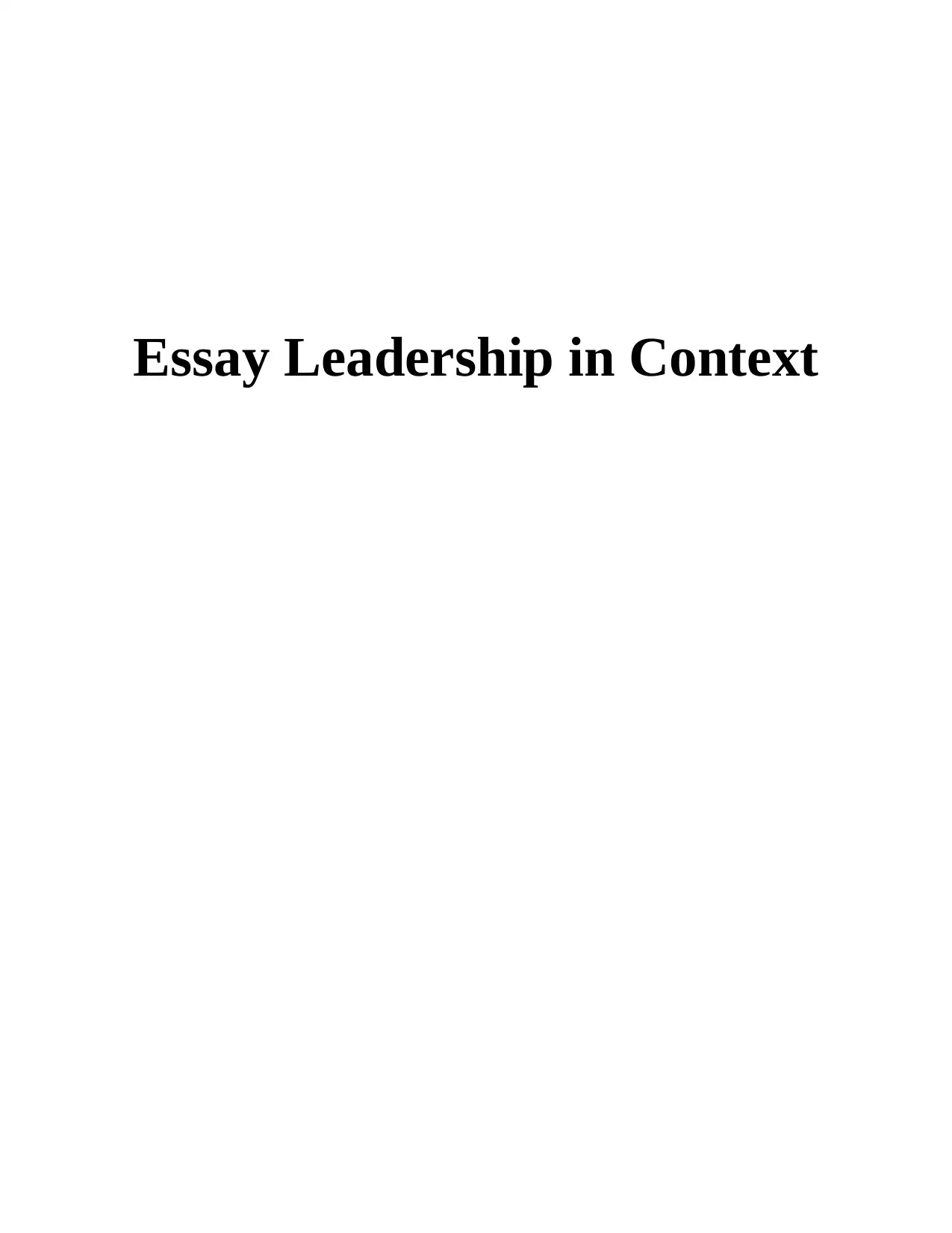
Essay Leadership in Context
Paraphrase This Document
Need a fresh take? Get an instant paraphrase of this document with our AI Paraphraser
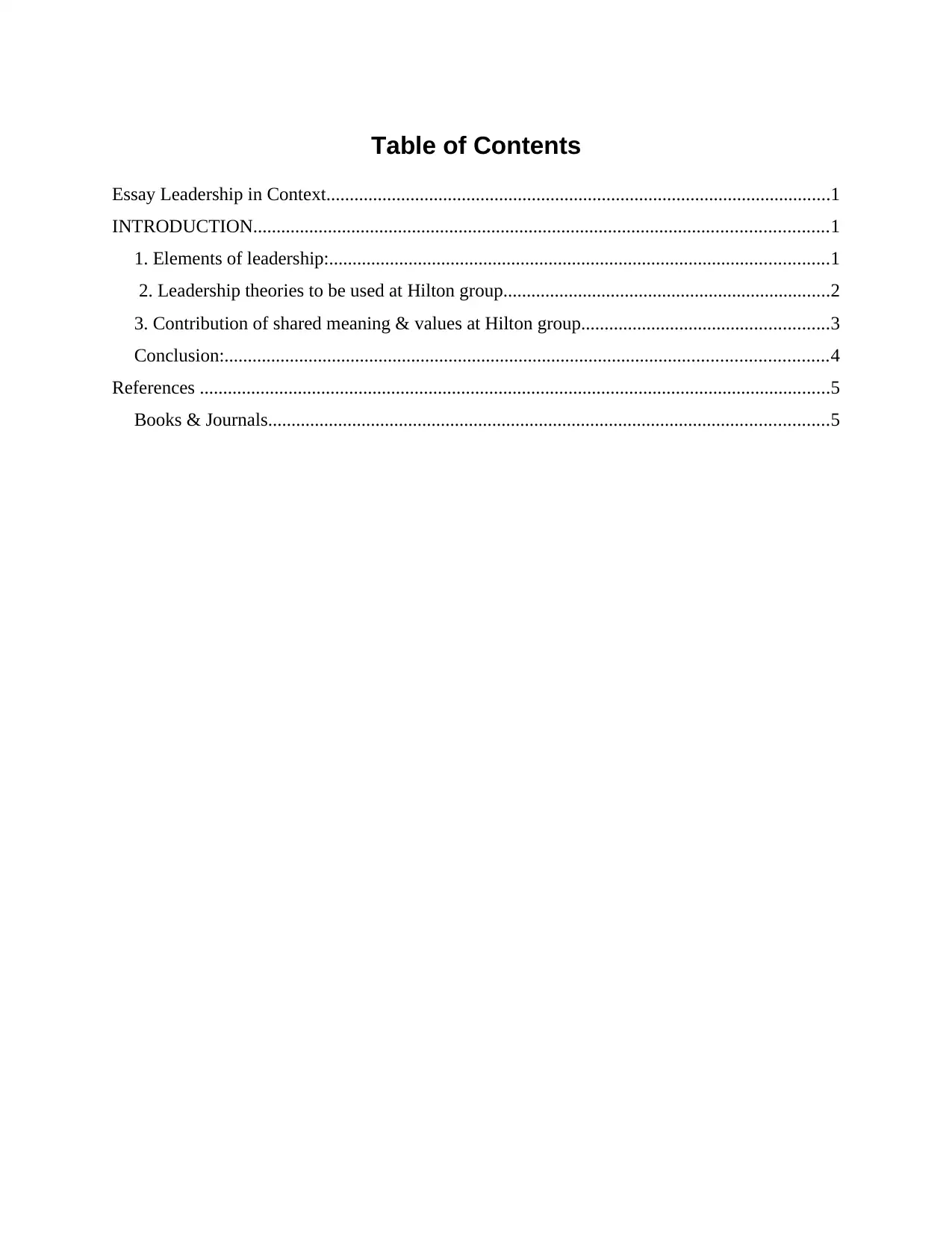
Table of Contents
Essay Leadership in Context............................................................................................................1
INTRODUCTION...........................................................................................................................1
1. Elements of leadership:...........................................................................................................1
2. Leadership theories to be used at Hilton group......................................................................2
3. Contribution of shared meaning & values at Hilton group.....................................................3
Conclusion:.................................................................................................................................4
References .......................................................................................................................................5
Books & Journals........................................................................................................................5
Essay Leadership in Context............................................................................................................1
INTRODUCTION...........................................................................................................................1
1. Elements of leadership:...........................................................................................................1
2. Leadership theories to be used at Hilton group......................................................................2
3. Contribution of shared meaning & values at Hilton group.....................................................3
Conclusion:.................................................................................................................................4
References .......................................................................................................................................5
Books & Journals........................................................................................................................5
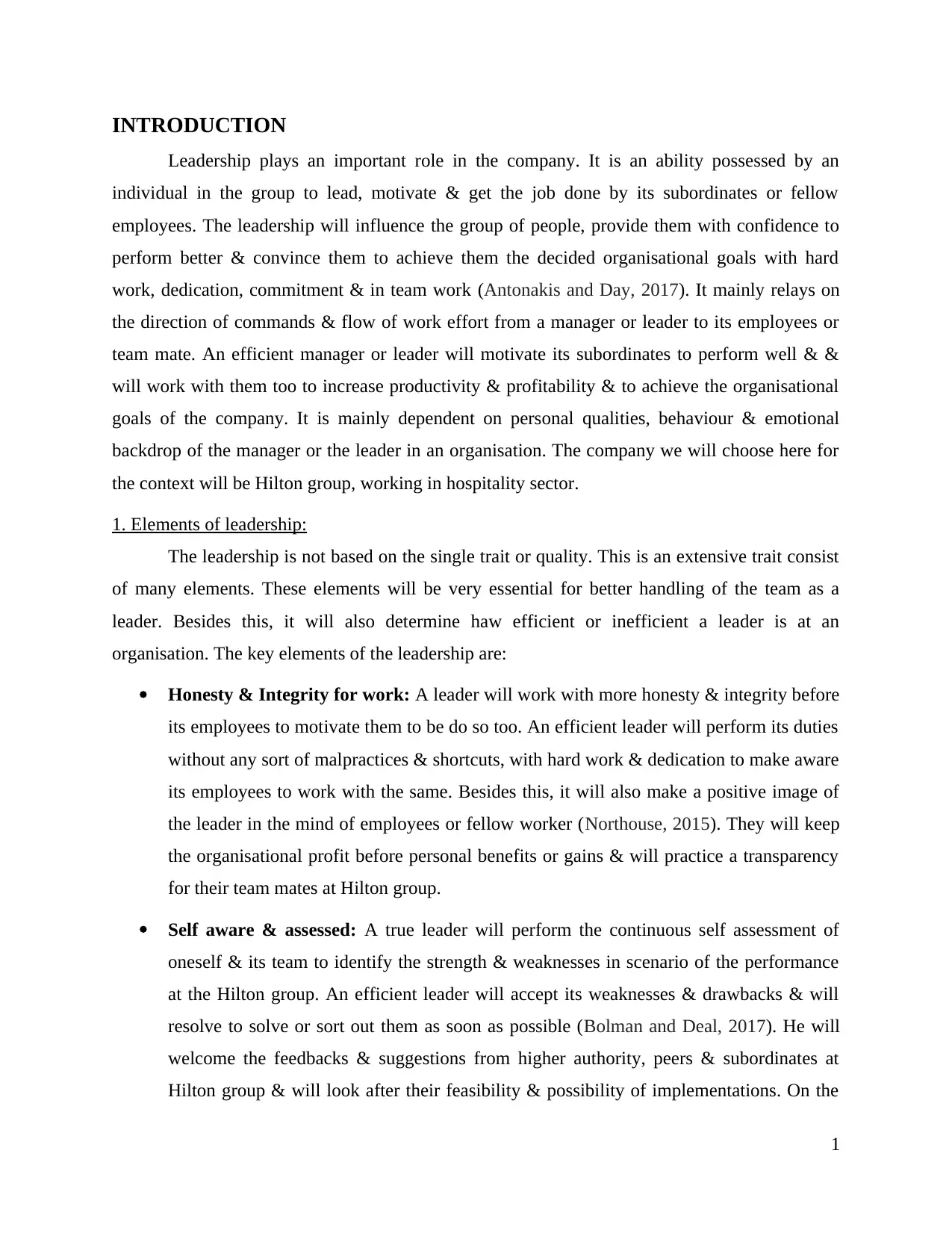
INTRODUCTION
Leadership plays an important role in the company. It is an ability possessed by an
individual in the group to lead, motivate & get the job done by its subordinates or fellow
employees. The leadership will influence the group of people, provide them with confidence to
perform better & convince them to achieve them the decided organisational goals with hard
work, dedication, commitment & in team work (Antonakis and Day, 2017). It mainly relays on
the direction of commands & flow of work effort from a manager or leader to its employees or
team mate. An efficient manager or leader will motivate its subordinates to perform well & &
will work with them too to increase productivity & profitability & to achieve the organisational
goals of the company. It is mainly dependent on personal qualities, behaviour & emotional
backdrop of the manager or the leader in an organisation. The company we will choose here for
the context will be Hilton group, working in hospitality sector.
1. Elements of leadership:
The leadership is not based on the single trait or quality. This is an extensive trait consist
of many elements. These elements will be very essential for better handling of the team as a
leader. Besides this, it will also determine haw efficient or inefficient a leader is at an
organisation. The key elements of the leadership are:
Honesty & Integrity for work: A leader will work with more honesty & integrity before
its employees to motivate them to be do so too. An efficient leader will perform its duties
without any sort of malpractices & shortcuts, with hard work & dedication to make aware
its employees to work with the same. Besides this, it will also make a positive image of
the leader in the mind of employees or fellow worker (Northouse, 2015). They will keep
the organisational profit before personal benefits or gains & will practice a transparency
for their team mates at Hilton group.
Self aware & assessed: A true leader will perform the continuous self assessment of
oneself & its team to identify the strength & weaknesses in scenario of the performance
at the Hilton group. An efficient leader will accept its weaknesses & drawbacks & will
resolve to solve or sort out them as soon as possible (Bolman and Deal, 2017). He will
welcome the feedbacks & suggestions from higher authority, peers & subordinates at
Hilton group & will look after their feasibility & possibility of implementations. On the
1
Leadership plays an important role in the company. It is an ability possessed by an
individual in the group to lead, motivate & get the job done by its subordinates or fellow
employees. The leadership will influence the group of people, provide them with confidence to
perform better & convince them to achieve them the decided organisational goals with hard
work, dedication, commitment & in team work (Antonakis and Day, 2017). It mainly relays on
the direction of commands & flow of work effort from a manager or leader to its employees or
team mate. An efficient manager or leader will motivate its subordinates to perform well & &
will work with them too to increase productivity & profitability & to achieve the organisational
goals of the company. It is mainly dependent on personal qualities, behaviour & emotional
backdrop of the manager or the leader in an organisation. The company we will choose here for
the context will be Hilton group, working in hospitality sector.
1. Elements of leadership:
The leadership is not based on the single trait or quality. This is an extensive trait consist
of many elements. These elements will be very essential for better handling of the team as a
leader. Besides this, it will also determine haw efficient or inefficient a leader is at an
organisation. The key elements of the leadership are:
Honesty & Integrity for work: A leader will work with more honesty & integrity before
its employees to motivate them to be do so too. An efficient leader will perform its duties
without any sort of malpractices & shortcuts, with hard work & dedication to make aware
its employees to work with the same. Besides this, it will also make a positive image of
the leader in the mind of employees or fellow worker (Northouse, 2015). They will keep
the organisational profit before personal benefits or gains & will practice a transparency
for their team mates at Hilton group.
Self aware & assessed: A true leader will perform the continuous self assessment of
oneself & its team to identify the strength & weaknesses in scenario of the performance
at the Hilton group. An efficient leader will accept its weaknesses & drawbacks & will
resolve to solve or sort out them as soon as possible (Bolman and Deal, 2017). He will
welcome the feedbacks & suggestions from higher authority, peers & subordinates at
Hilton group & will look after their feasibility & possibility of implementations. On the
1
⊘ This is a preview!⊘
Do you want full access?
Subscribe today to unlock all pages.

Trusted by 1+ million students worldwide
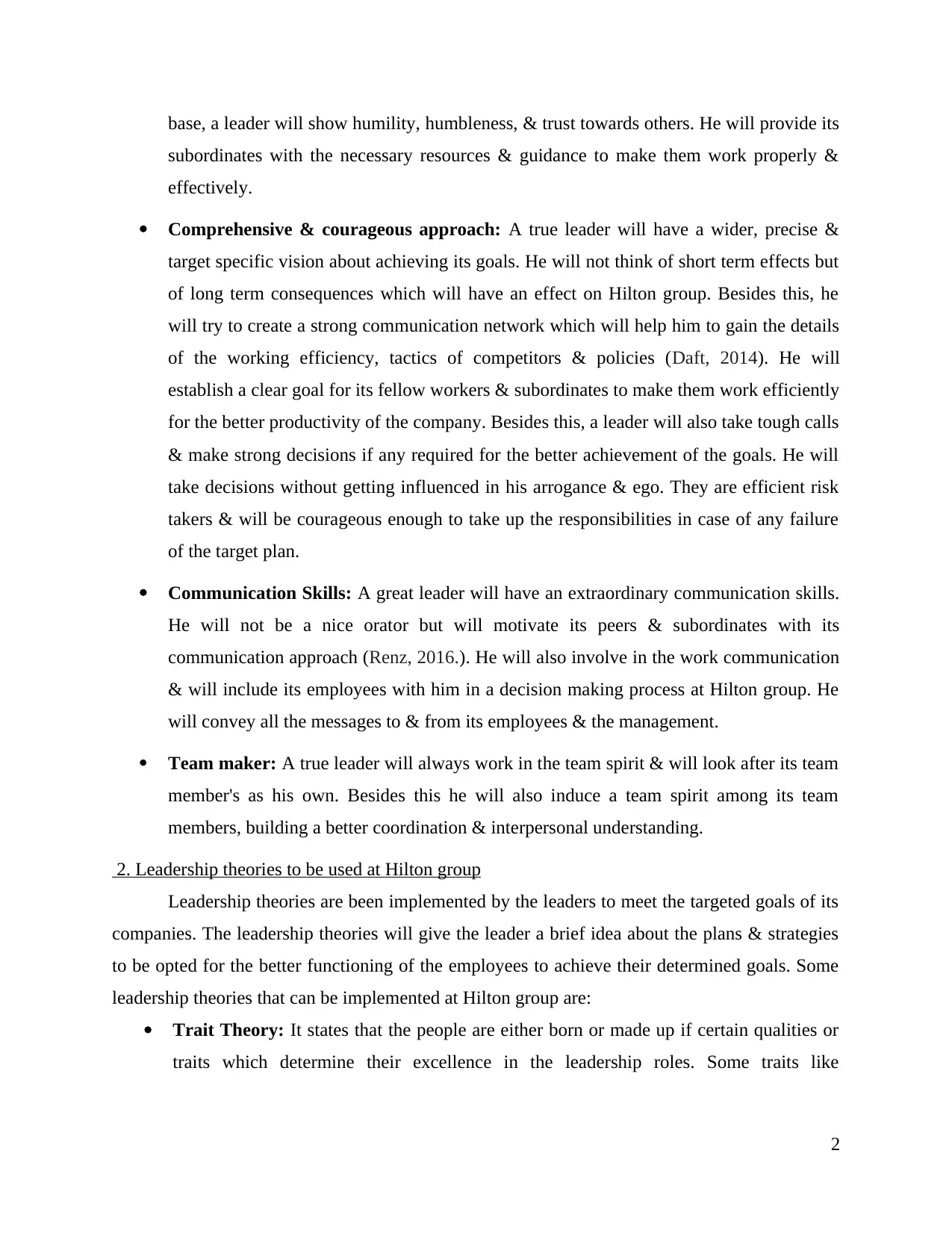
base, a leader will show humility, humbleness, & trust towards others. He will provide its
subordinates with the necessary resources & guidance to make them work properly &
effectively.
Comprehensive & courageous approach: A true leader will have a wider, precise &
target specific vision about achieving its goals. He will not think of short term effects but
of long term consequences which will have an effect on Hilton group. Besides this, he
will try to create a strong communication network which will help him to gain the details
of the working efficiency, tactics of competitors & policies (Daft, 2014). He will
establish a clear goal for its fellow workers & subordinates to make them work efficiently
for the better productivity of the company. Besides this, a leader will also take tough calls
& make strong decisions if any required for the better achievement of the goals. He will
take decisions without getting influenced in his arrogance & ego. They are efficient risk
takers & will be courageous enough to take up the responsibilities in case of any failure
of the target plan.
Communication Skills: A great leader will have an extraordinary communication skills.
He will not be a nice orator but will motivate its peers & subordinates with its
communication approach (Renz, 2016.). He will also involve in the work communication
& will include its employees with him in a decision making process at Hilton group. He
will convey all the messages to & from its employees & the management.
Team maker: A true leader will always work in the team spirit & will look after its team
member's as his own. Besides this he will also induce a team spirit among its team
members, building a better coordination & interpersonal understanding.
2. Leadership theories to be used at Hilton group
Leadership theories are been implemented by the leaders to meet the targeted goals of its
companies. The leadership theories will give the leader a brief idea about the plans & strategies
to be opted for the better functioning of the employees to achieve their determined goals. Some
leadership theories that can be implemented at Hilton group are:
Trait Theory: It states that the people are either born or made up if certain qualities or
traits which determine their excellence in the leadership roles. Some traits like
2
subordinates with the necessary resources & guidance to make them work properly &
effectively.
Comprehensive & courageous approach: A true leader will have a wider, precise &
target specific vision about achieving its goals. He will not think of short term effects but
of long term consequences which will have an effect on Hilton group. Besides this, he
will try to create a strong communication network which will help him to gain the details
of the working efficiency, tactics of competitors & policies (Daft, 2014). He will
establish a clear goal for its fellow workers & subordinates to make them work efficiently
for the better productivity of the company. Besides this, a leader will also take tough calls
& make strong decisions if any required for the better achievement of the goals. He will
take decisions without getting influenced in his arrogance & ego. They are efficient risk
takers & will be courageous enough to take up the responsibilities in case of any failure
of the target plan.
Communication Skills: A great leader will have an extraordinary communication skills.
He will not be a nice orator but will motivate its peers & subordinates with its
communication approach (Renz, 2016.). He will also involve in the work communication
& will include its employees with him in a decision making process at Hilton group. He
will convey all the messages to & from its employees & the management.
Team maker: A true leader will always work in the team spirit & will look after its team
member's as his own. Besides this he will also induce a team spirit among its team
members, building a better coordination & interpersonal understanding.
2. Leadership theories to be used at Hilton group
Leadership theories are been implemented by the leaders to meet the targeted goals of its
companies. The leadership theories will give the leader a brief idea about the plans & strategies
to be opted for the better functioning of the employees to achieve their determined goals. Some
leadership theories that can be implemented at Hilton group are:
Trait Theory: It states that the people are either born or made up if certain qualities or
traits which determine their excellence in the leadership roles. Some traits like
2
Paraphrase This Document
Need a fresh take? Get an instant paraphrase of this document with our AI Paraphraser
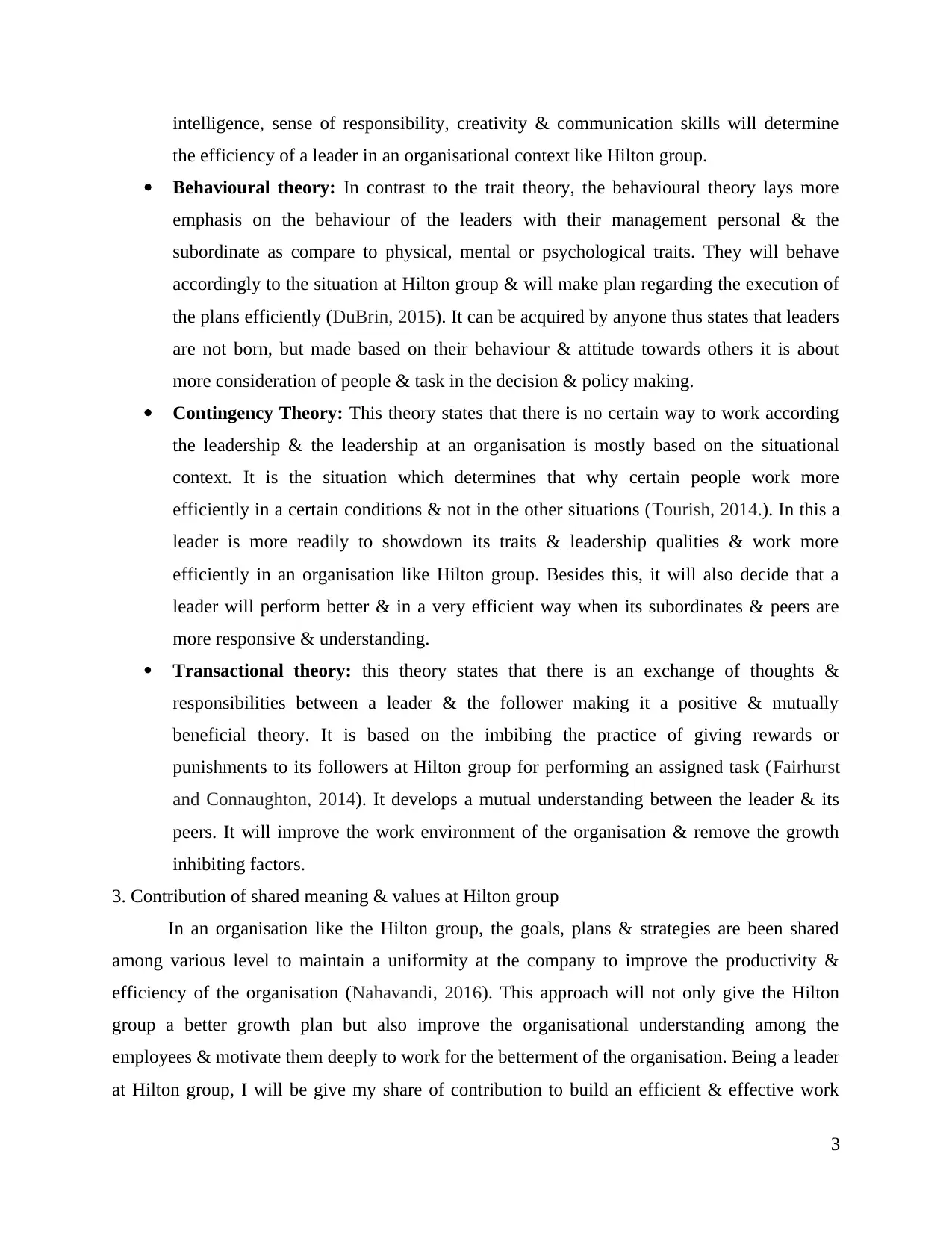
intelligence, sense of responsibility, creativity & communication skills will determine
the efficiency of a leader in an organisational context like Hilton group.
Behavioural theory: In contrast to the trait theory, the behavioural theory lays more
emphasis on the behaviour of the leaders with their management personal & the
subordinate as compare to physical, mental or psychological traits. They will behave
accordingly to the situation at Hilton group & will make plan regarding the execution of
the plans efficiently (DuBrin, 2015). It can be acquired by anyone thus states that leaders
are not born, but made based on their behaviour & attitude towards others it is about
more consideration of people & task in the decision & policy making.
Contingency Theory: This theory states that there is no certain way to work according
the leadership & the leadership at an organisation is mostly based on the situational
context. It is the situation which determines that why certain people work more
efficiently in a certain conditions & not in the other situations (Tourish, 2014.). In this a
leader is more readily to showdown its traits & leadership qualities & work more
efficiently in an organisation like Hilton group. Besides this, it will also decide that a
leader will perform better & in a very efficient way when its subordinates & peers are
more responsive & understanding.
Transactional theory: this theory states that there is an exchange of thoughts &
responsibilities between a leader & the follower making it a positive & mutually
beneficial theory. It is based on the imbibing the practice of giving rewards or
punishments to its followers at Hilton group for performing an assigned task (Fairhurst
and Connaughton, 2014). It develops a mutual understanding between the leader & its
peers. It will improve the work environment of the organisation & remove the growth
inhibiting factors.
3. Contribution of shared meaning & values at Hilton group
In an organisation like the Hilton group, the goals, plans & strategies are been shared
among various level to maintain a uniformity at the company to improve the productivity &
efficiency of the organisation (Nahavandi, 2016). This approach will not only give the Hilton
group a better growth plan but also improve the organisational understanding among the
employees & motivate them deeply to work for the betterment of the organisation. Being a leader
at Hilton group, I will be give my share of contribution to build an efficient & effective work
3
the efficiency of a leader in an organisational context like Hilton group.
Behavioural theory: In contrast to the trait theory, the behavioural theory lays more
emphasis on the behaviour of the leaders with their management personal & the
subordinate as compare to physical, mental or psychological traits. They will behave
accordingly to the situation at Hilton group & will make plan regarding the execution of
the plans efficiently (DuBrin, 2015). It can be acquired by anyone thus states that leaders
are not born, but made based on their behaviour & attitude towards others it is about
more consideration of people & task in the decision & policy making.
Contingency Theory: This theory states that there is no certain way to work according
the leadership & the leadership at an organisation is mostly based on the situational
context. It is the situation which determines that why certain people work more
efficiently in a certain conditions & not in the other situations (Tourish, 2014.). In this a
leader is more readily to showdown its traits & leadership qualities & work more
efficiently in an organisation like Hilton group. Besides this, it will also decide that a
leader will perform better & in a very efficient way when its subordinates & peers are
more responsive & understanding.
Transactional theory: this theory states that there is an exchange of thoughts &
responsibilities between a leader & the follower making it a positive & mutually
beneficial theory. It is based on the imbibing the practice of giving rewards or
punishments to its followers at Hilton group for performing an assigned task (Fairhurst
and Connaughton, 2014). It develops a mutual understanding between the leader & its
peers. It will improve the work environment of the organisation & remove the growth
inhibiting factors.
3. Contribution of shared meaning & values at Hilton group
In an organisation like the Hilton group, the goals, plans & strategies are been shared
among various level to maintain a uniformity at the company to improve the productivity &
efficiency of the organisation (Nahavandi, 2016). This approach will not only give the Hilton
group a better growth plan but also improve the organisational understanding among the
employees & motivate them deeply to work for the betterment of the organisation. Being a leader
at Hilton group, I will be give my share of contribution to build an efficient & effective work
3
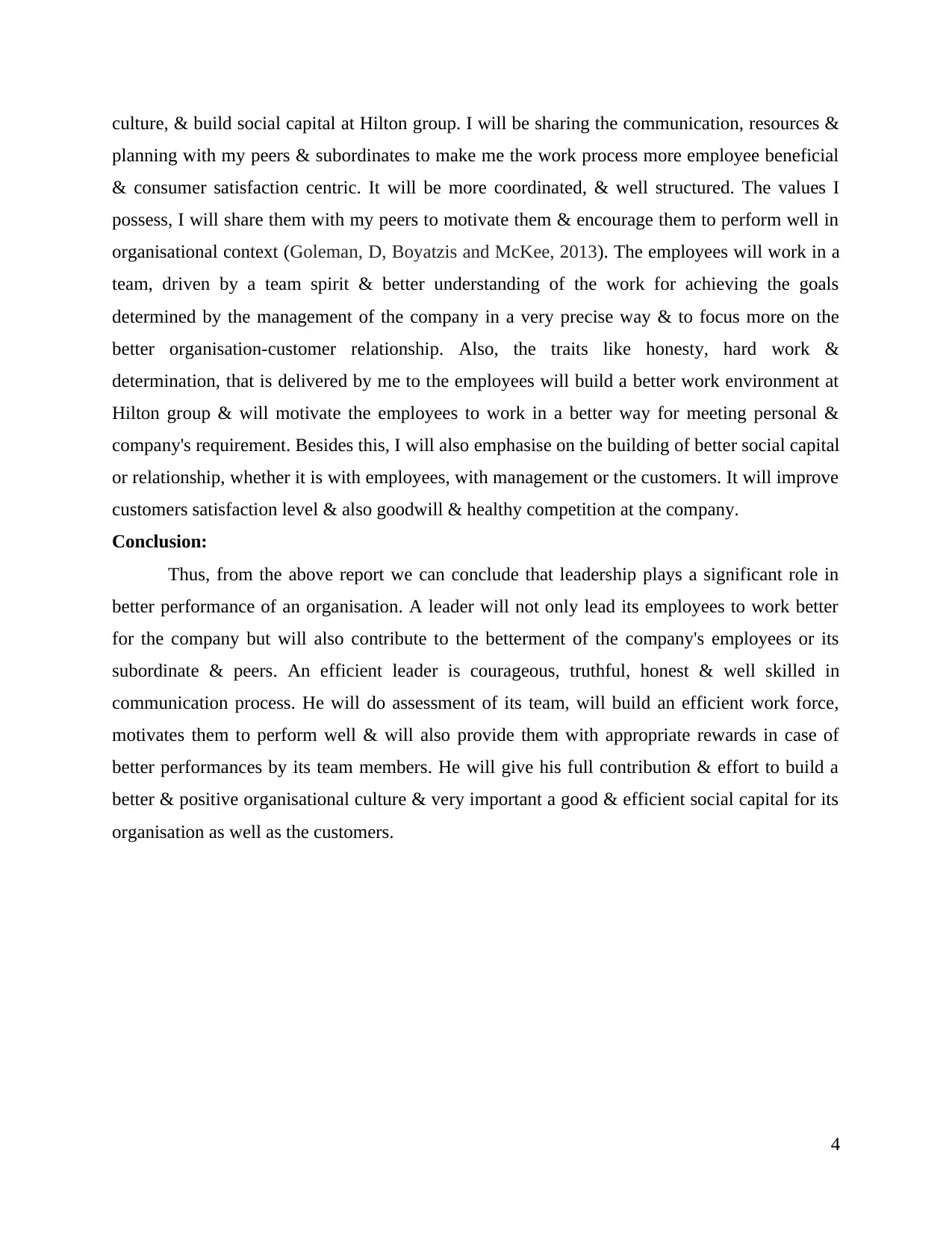
culture, & build social capital at Hilton group. I will be sharing the communication, resources &
planning with my peers & subordinates to make me the work process more employee beneficial
& consumer satisfaction centric. It will be more coordinated, & well structured. The values I
possess, I will share them with my peers to motivate them & encourage them to perform well in
organisational context (Goleman, D, Boyatzis and McKee, 2013). The employees will work in a
team, driven by a team spirit & better understanding of the work for achieving the goals
determined by the management of the company in a very precise way & to focus more on the
better organisation-customer relationship. Also, the traits like honesty, hard work &
determination, that is delivered by me to the employees will build a better work environment at
Hilton group & will motivate the employees to work in a better way for meeting personal &
company's requirement. Besides this, I will also emphasise on the building of better social capital
or relationship, whether it is with employees, with management or the customers. It will improve
customers satisfaction level & also goodwill & healthy competition at the company.
Conclusion:
Thus, from the above report we can conclude that leadership plays a significant role in
better performance of an organisation. A leader will not only lead its employees to work better
for the company but will also contribute to the betterment of the company's employees or its
subordinate & peers. An efficient leader is courageous, truthful, honest & well skilled in
communication process. He will do assessment of its team, will build an efficient work force,
motivates them to perform well & will also provide them with appropriate rewards in case of
better performances by its team members. He will give his full contribution & effort to build a
better & positive organisational culture & very important a good & efficient social capital for its
organisation as well as the customers.
4
planning with my peers & subordinates to make me the work process more employee beneficial
& consumer satisfaction centric. It will be more coordinated, & well structured. The values I
possess, I will share them with my peers to motivate them & encourage them to perform well in
organisational context (Goleman, D, Boyatzis and McKee, 2013). The employees will work in a
team, driven by a team spirit & better understanding of the work for achieving the goals
determined by the management of the company in a very precise way & to focus more on the
better organisation-customer relationship. Also, the traits like honesty, hard work &
determination, that is delivered by me to the employees will build a better work environment at
Hilton group & will motivate the employees to work in a better way for meeting personal &
company's requirement. Besides this, I will also emphasise on the building of better social capital
or relationship, whether it is with employees, with management or the customers. It will improve
customers satisfaction level & also goodwill & healthy competition at the company.
Conclusion:
Thus, from the above report we can conclude that leadership plays a significant role in
better performance of an organisation. A leader will not only lead its employees to work better
for the company but will also contribute to the betterment of the company's employees or its
subordinate & peers. An efficient leader is courageous, truthful, honest & well skilled in
communication process. He will do assessment of its team, will build an efficient work force,
motivates them to perform well & will also provide them with appropriate rewards in case of
better performances by its team members. He will give his full contribution & effort to build a
better & positive organisational culture & very important a good & efficient social capital for its
organisation as well as the customers.
4
⊘ This is a preview!⊘
Do you want full access?
Subscribe today to unlock all pages.

Trusted by 1+ million students worldwide
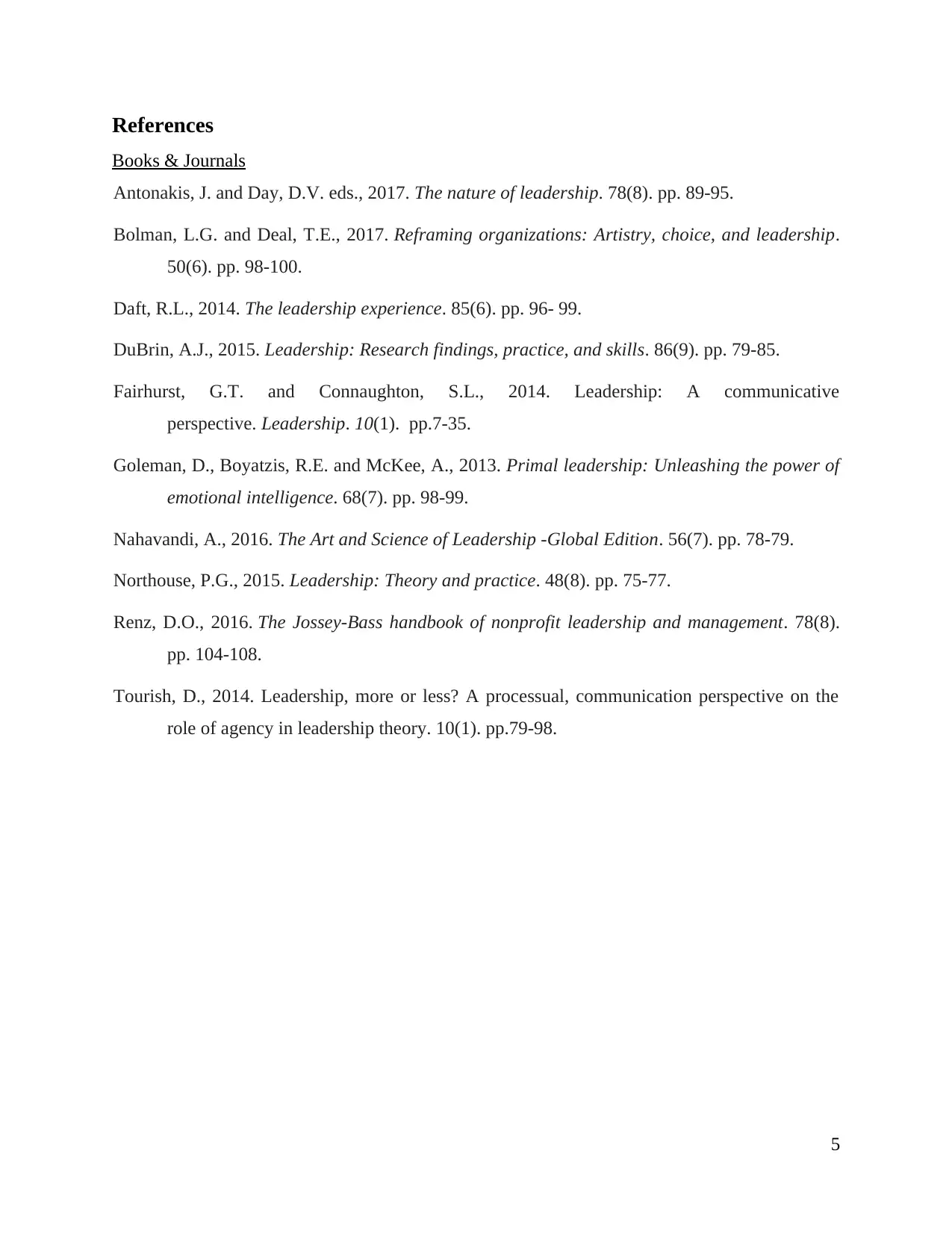
References
Books & Journals
Antonakis, J. and Day, D.V. eds., 2017. The nature of leadership. 78(8). pp. 89-95.
Bolman, L.G. and Deal, T.E., 2017. Reframing organizations: Artistry, choice, and leadership.
50(6). pp. 98-100.
Daft, R.L., 2014. The leadership experience. 85(6). pp. 96- 99.
DuBrin, A.J., 2015. Leadership: Research findings, practice, and skills. 86(9). pp. 79-85.
Fairhurst, G.T. and Connaughton, S.L., 2014. Leadership: A communicative
perspective. Leadership. 10(1). pp.7-35.
Goleman, D., Boyatzis, R.E. and McKee, A., 2013. Primal leadership: Unleashing the power of
emotional intelligence. 68(7). pp. 98-99.
Nahavandi, A., 2016. The Art and Science of Leadership -Global Edition. 56(7). pp. 78-79.
Northouse, P.G., 2015. Leadership: Theory and practice. 48(8). pp. 75-77.
Renz, D.O., 2016. The Jossey-Bass handbook of nonprofit leadership and management. 78(8).
pp. 104-108.
Tourish, D., 2014. Leadership, more or less? A processual, communication perspective on the
role of agency in leadership theory. 10(1). pp.79-98.
5
Books & Journals
Antonakis, J. and Day, D.V. eds., 2017. The nature of leadership. 78(8). pp. 89-95.
Bolman, L.G. and Deal, T.E., 2017. Reframing organizations: Artistry, choice, and leadership.
50(6). pp. 98-100.
Daft, R.L., 2014. The leadership experience. 85(6). pp. 96- 99.
DuBrin, A.J., 2015. Leadership: Research findings, practice, and skills. 86(9). pp. 79-85.
Fairhurst, G.T. and Connaughton, S.L., 2014. Leadership: A communicative
perspective. Leadership. 10(1). pp.7-35.
Goleman, D., Boyatzis, R.E. and McKee, A., 2013. Primal leadership: Unleashing the power of
emotional intelligence. 68(7). pp. 98-99.
Nahavandi, A., 2016. The Art and Science of Leadership -Global Edition. 56(7). pp. 78-79.
Northouse, P.G., 2015. Leadership: Theory and practice. 48(8). pp. 75-77.
Renz, D.O., 2016. The Jossey-Bass handbook of nonprofit leadership and management. 78(8).
pp. 104-108.
Tourish, D., 2014. Leadership, more or less? A processual, communication perspective on the
role of agency in leadership theory. 10(1). pp.79-98.
5
1 out of 7
Related Documents
Your All-in-One AI-Powered Toolkit for Academic Success.
+13062052269
info@desklib.com
Available 24*7 on WhatsApp / Email
![[object Object]](/_next/static/media/star-bottom.7253800d.svg)
Unlock your academic potential
Copyright © 2020–2025 A2Z Services. All Rights Reserved. Developed and managed by ZUCOL.





